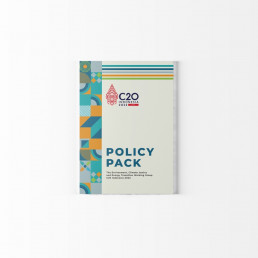Bringing the principle of climate justice to the front of climate actions Human-induced climate change is a threat to the health of the planet and the wellbeing of global citizens. It also threatens the global economy. World economy could be 10-18% smaller if the world fails to meet the 2050 net-zero emissions and Paris Agree- ments targets on climate change. This disastrous effect will not be felt evenly. Develop- ing economies are projected to face bigger losses than advanced ones in the northern hemisphere, bringing climate justice concerns to the forefront.
Those with the least responsibility in causing climate change are increasingly exposed to its impacts. Increasing weather and climate extreme events have exposed millions of people to acute food insecurity and reduced water security, with the largest impacts observed in many locations and/or communities in Africa, Asia, Central and South Ameri- ca, Small Islands and the Arctic. Sudden losses of food production and access to food compounded by decreased diet diversity have increased malnutrition in many communi- ties, especially for Indigenous Peoples, small-scale food producers and low-income households, with children, elderly people and pregnant women particularly impacted. Climate change is also contributing to humanitarian crises where climate hazards inter- act with high vulnerability. This has also exacerbated inequitable social conditions, wid- ening the gap between low-income communities, people of color, Indigenous Peoples and Local Communities/IPLCs, people with disabilities, women, or older or very young people. In addition, for too long, development and climate initiatives have treated these vulnerable groups as victims, not agents of change who can lead and become a part of the decision-making process.
There has been a severe lack of discussion regarding climate justice in many internation- al negotiations and multilateral forums, not excluding the G20. Essentially, the principle of climate justice and inclusivity should be the cornerstone in every design and imple- mentation of climate change negotiations and agreements. This principle is often side- lined, although it bolsters significant support to the achievement of Net Zero Emission (NZE) and Paris Agreement target to halt temperature rise to 1.5C or lower. Decisions regarding development and climate action must therefore be mindful and respectful of the rights, needs, and demands of the most vulnerable. Emphasizing on the principle of climate justice should not also be taken as creating fission or amplifying the North-South debate in the climate action. Cooperations, collaborations, and partnerships are all indis- pensable in the fight for climate sustainability. However, these partnerships must be built on fair and just exchanges, to minimize inequality and ensure that co-benefits can be achieved. If governments fail to acknowledge that the principle of climate justice is essential to halt the climate crises, the crises will only be exacerbated and broaden the structural inequality gap between countries or communities.
We realize that achieving climate justice is a work on progress. In this policy brief, we outlined several issues and challenges faced by communities and the civil society in building environmental action and energy transition. The issues and recommendations below are based on the stories of the communities impacted by climate change, scientific research, academic papers, and also previous G20 works on climate change and energy transition. The Environment, Climate Justice, and Energy Transition Working Group (ECEWG) of Civil-20 Indonesia hopes that this year’s G20 Presidency of Indonesia can be the first G20 to deliver actions to achieve climate justice in their outcomes as the legacy for future G20 meetings and summits.
